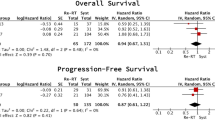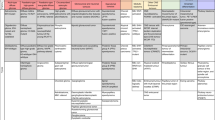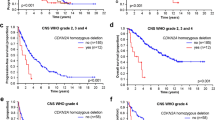Opinion statement
Optimal management of newly diagnosed glioblastoma multiforme includes maximal surgical resection, followed by 60 Gy of external beam radiation plus concomitant daily temozolomide and at least six additional monthly cycles of maintenance temozolomide. Several large phase 3 trials are now ongoing to determine whether agents added to this regimen may confer further survival advantage. At the time of disease recurrence, bevacizumab is the most commonly used agent. Whenever feasible, patients should be encouraged to participate in clinical trials, which are currently focused on antiangiogenic and targeted therapies.
Similar content being viewed by others
References and Recommended Reading
Wen PY, Kesari S: Malignant gliomas in adults. N Engl J Med 2008, 359:492–507.
The Cancer Genome Atlas Research Network: Comprehensive genomic characterization defines human glioblastoma genes and core pathways. Nature 2008, 455:1061–1068.
Stummer W, Reulen HJ, Meinel T, et al.: Extent of resection and survival in glioblastoma multiforme: identification of and adjustment for bias. Neurosurgery 2008, 62:564–576.
Mirimanoff RO, Gorlia T, Mason W, et al.: Radiotherapy and temozolomide for newly diagnosed glioblastoma: recursive partitioning analysis of the EORTC 26981/22981-NCIC CE3 phase III randomized trial. J Clin Oncol 2006, 24:2563–2569.
Laperriere N, Zuraw L, Cairncross G, et al.: Radiotherapy for newly diagnosed malignant glioma in adults: a systematic review. Radiother Oncol 2002, 64:259–273.
Souhami L, Seiferheld W, Brachman D, et al.: Randomized comparison of stereotactic radiosurgery followed by conventional radiotherapy with carmustine to conventional radiotherapy with carmustine for patients with glioblastoma multiforme: report of Radiation Therapy Oncology Group 93-05 protocol. Int J Radiat Oncol Biol Phys 2004, 60:853–860.
Hegi ME, Liu L, Herman JG, et al.: Correlation of O6-methylguanine methyltransferase (MGMT) promoter methylation with clinical outcomes in glioblastoma and clinical strategies to modulate MGMT activity. J Clin Oncol 2008, 26:4189–4199.
Stupp R, Mason WP, van den Bent MJ, et al.: Radiotherapy plus concomitant and adjuvant temozolomide for glioblastoma. N Engl J Med 2005, 352:987–996.
Hegi ME, Diserens AC, Gorlia T, et al.: MGMT gene silencing and benefit from temozolomide in glioblastoma. N Engl J Med 2005, 352:997–1003.
Reardon DA, Fink KL, Mikkelsen T, et al.: Randomized phase II study of cilengitide, an integrin-targeting arginineglycine-aspartic acid peptide, in recurrent glioblastoma multiforme. J Clin Oncol 2008, 26:5610–5617.
Reardon DA, Zalutsky MR, Akabani G, et al.: A pilot study: 131I-Antitenascin monoclonal antibody 81c6 to deliver a 44-Gy resection cavity boost. Neuro-oncology 2008, 10:182–189.
Lamszus K, Ulbricht U, Matschke J, et al.: Levels of soluble vascular endothelial growth factor (VEGF) receptor 1 in astrocytic tumors and its relation to malignancy, vascularity, and VEGF-A. Clin Cancer Res 2003, 9:1399–1405.
Vredenburgh JJ, Desjardins A, Herndon JE, et al.: Bevacizumab plus irinotecan in recurrent glioblastoma multiforme. J Clin Oncol 2007, 25:4722–4729.
Cloughesy TF, Prados MD, Wen PY, et al.: A phase II, randomized non-comparative clinical trial of the effect of bevacizumab (BV) alone or in combination with irinotecan (CPT) on 6-month progression free survival (PFS6) in recurrent, treatment-refractory glioblastoma (GBM) [abstract 2010b]. J Clin Oncol 2008, 26(May 20 Suppl):2010b.
Lai A, Filka E, McGibbon B, et al.: Phase II pilot study of bevacizumab in combination with temozolomide and regional radiation therapy for up-front treatment of patients with newly diagnosed glioblastoma multiforme: interim analysis of safety and tolerability. Int J Radiat Oncol Biol Phys 2008, 71:1372–1380.
Brandes AA, Franceschi E, Tosoni A, et al.: Epidermal growth factor receptor inhibitors in neuro-oncology: hopes and disappointments. Clin Cancer Res 2008, 14:957–960.
Sampson JH, Archer GE, Bigner DD, et al.: Effect of EGFRvIII-targeted vaccine (CDX-110) on immune response and TTP when given with simultaneous standard and continuous temozolomide in patients with GBM [abstract 2011]. J Clin Oncol 2008, 26(May 20 Suppl):2011.
Wong ET, Hess KR, Gleason MJ, et al.: Outcomes and prognostic factors in recurrent glioma patients enrolled onto phase II clinical trials. J Clin Oncol 1999, 17:2572–2578.
Batchelor TT, Sorensen AG, Tomaso ED, et al.: AZD2171, a pan-VEGF receptor tyrosine kinase inhibitor, normalizes tumor vasculature and alleviates edema in glioblastoma patients. Cancer Cell 2007, 11:83–95.
Brandes AA, Tosoni A, Cavallo G, et al.: Temozolomide 3 weeks on and 1 week off as first-line therapy for recurrent glioblastoma: phase II study from Gruppo Italiano Cooperativo di Neuro-oncologia (GICNO). Br J Cancer 2006, 95:1155–1160.
Wick A, Felsberg J, Steinbach JP, et al.: Efficacy and tolerability of temozolomide in an alternating weekly regimen in patients with recurrent glioma. J Clin Oncol 2007, 25:3357–3361.
Mason W, Perry J, Belanger K, et al.: The temozolomide rescue study: a phase II trial of continuous (28/28) doseintense temozolomide after progression on conventional 5/28 day temzolomide in patients with recurrent malignant glioma [abstract MA-61]. Neuro-oncology 2008, 10:MA–61.
Brandes AA, Franceschi E, Tosoni A, et al.: MGMT promoter methylation status can predict the incidence and outcome of pseudoprogression after concomitant radiochemotherapy in newly diagnosed glioblastoma patients. J Clin Oncol 2008, 26:2191–2197.
Haas-Kogan DA, Prados MD, Tihan T, et al.: Epidermal growth factor receptor, protein kinase B/Akt, and glioma response to erlotinib. J Natl Cancer Inst 2005, 97:880–887.
Mellinghoff IK, Wang MY, Vivanco I, et al.: Molecular determinants of the response of glioblastomas to EGFR kinase inhibitors. N Engl J Med 2005, 353:2012–2024.
Van Den Bent M, Brandes A, Rampling R, et al.: Randomized phase II trial of erlotinib versus temozolomide or BCNU in recurrent glioblastoma multiforme: EORTC 26034 [abstract MA-27]. Neuro-oncology 2007, 9:MA–27.
Wen P, Kuhn J, Chang S, et al.: Phase I/II study of erlotinib and temsirolimus for patients with recurrent malignant gliomas (NABTC 04-02) [abstract MA-29]. Neuro-oncology 2008, 10:MA–29.
Schiff D, Sarkaria J, Decker P, et al.: Phase I study of temsirolimus and sorafenib in recurrent glioblastoma: North Central Cancer Treatment Group (NCCTG) N0572 [abstract MA-14]. Neuro-oncology 2007, 9:MA–14.
Kreisl TN, Lassman AB, Mischel PS, et al.: A pilot study of everolimus and gefitinib in the treatment of recurrent glioblastoma. J Neurooncol 2009, 92:99–105.
Brem H, Piantadosi S, Burger PC, et al.: Placebo-controlled trial of safety and efficacy of intraoperative controlled delivery by biodegradable polymers of chemotherapy for recurrent gliomas. Lancet 1995, 345:1008–1012.
Medical Research Council Brain Tumor Working Party: Randomized trial of procarbazine, lomustine, and vincristine in the adjuvant treatment of high-grade astrocytoma: a Medical Research Council trial. J Clin Oncol 2001, 19:509–518.
Keime-Guilbert F, Chinot O, Taillandier L, et al.: Radiotherapy for glioblastoma in the elderly. N Engl J Med 2007, 356:1527–1535.
Roa W, Brasher PMA, Bauman G, et al.: Abbreviated course of radiation therapy in older patients with glioblastoma multiforme: a prospective randomized clinical trial. J Clin Oncol 2004, 22:1–6.
Chinot OL, Barrie M, Frauger E, et al.: Phase II study of temozolomide without radiotherapy in newly diagnosed glioblastoma multiforme in an elderly populations. Cancer 2004, 100:2208–2214.
Barnholtz-Sloan JS, Williams VL, Maldonado JL, et al.: Patterns of care and outcomes among elderly individuals with primary malignant astrocytoma. J Neurosurg 2008, 108:642–648.
De Groot JF, Wen PY, Lamborn K, et al.: Phase II single arm trial of aflibercept in patients with recurrent temozolomide-resistant glioblastoma: NABTC 0601 [abstract 2020]. J Clin Oncol 2008, 26(May 20 Suppl):2020.
Fine HA, Puduvalli VK, Chamberlain MC, et al.: Enzastaurin versus lomustine in the treatment of recurrent, intracranial glioblastoma multiforme: a phase III study [abstract 2005]. J Clin Oncol 2008, 26:2005.
Reardon D, Groves M, Wen P, et al.: A phase II trial of lapatinib and pazopanib for patients with recurrent glioblastoma multiforme [abstract MA-07]. Neuro-oncology 2007, 9:MA–07.
Dresemann G, Weller M, Bogdahn U, et al.: Imatinib plus hydroxyurea versus hydroxyurea monotherapy in progressive glioblastoma-an international multi-center, open-label, randomized phase III study (AMBROSIASTUDY) [abstract MA-19]. Neuro-oncology 2008, 10:MA–19.
Conrad C, Friedman H, Reardon D, et al.: A phase I/II trial of single-agent PTK 787/ZK 222584, a novel, oral angiogenesis inhibitor, in patients with recurrent glioblastoma multiforme [abstract 1512]. J Clin Oncol 2004, 22:1512.
Chaskis C, Sadones A, Michotte M, et al.: A phase II trial of sunitinib in patients with recurrent high-grade glioma [abstract 13001]. J Clin Oncol 2008, 26(May 20 Suppl):13001.
Fine HA, Figg WD, Jaeckle K, et al.: Phase II trial of the antiangiogenic agent thalidomide in patients with recurrent high-grade gliomas. J Clin Oncol 2000, 18:708–715.
BIBW 2992 with or without daily temozolomide in the treatment of patients with recurrent malignant glioma. Available at http://clinicaltrials.gov/ct2/show/NCT00727506. Accessed February 2009.
Neyns B, Sadones J, Joosens E, et al.: A multicenter stratified phase II study of cetuzimab for the treatment of patients with recurrent high-grade glioma [abstract 2017]. J Clin Oncol 2008, 26(May 20 Suppl):2017.
Peereboom D, Olson J, Nabors B, et al.: NABTT 0502: phase II trial of erlotinib and sorafenib for patients with progressive or recurrent glioblastoma multiforme [abstract MA-37]. Neuro-oncology 2007, 9:MA–37.
Rich JN, Reardon DA, Perry T, et al.: Phase II trial of gefitinib in recurrent glioblastoma. J Clin Oncol 2004, 22:133–142.
Lassman A, Holland E, DeAngelis L, et al.: Clinical and molecular-metabolic phase II trial of perifosine for recurrent/progressive malignant glioma [abstract MA-15]. Neuro-oncology 2007, 9:MA–15.
Galanis E, Buckner JC, Maurer MJ, et al.: Phase II trial of temsirolimus in recurrent glioblastoma multiforme: a North Central Cancer Treatment Group study. J Clin Oncol 2005, 23:5294–5304.
Cloughesy TF, Wen PY, Robins HI, et al.: Phase II trial of tipifarnib in patients with recurrent malignant glioma either receiving or not receiving enzyme-inducing antiepileptic drugs: a North American Brain Tumor Consortium study. J Clin Oncol 2006, 24:3651–3656.
Gilbert M, Gaupp P, Ictech S, et al.: A phase I/II study of temozolomide and the farnesyltransferase inhibitor, tipifarnib in recurrent glioblastoma [abstract MA-34]. Neuro-oncology 2007, 9:MA–34.
Author information
Authors and Affiliations
Corresponding author
Rights and permissions
About this article
Cite this article
Welch, M., Lai, R. Glioblastoma multiforme. Curr Treat Options Neurol 11, 297–305 (2009). https://doi.org/10.1007/s11940-009-0033-5
Published:
Issue Date:
DOI: https://doi.org/10.1007/s11940-009-0033-5




